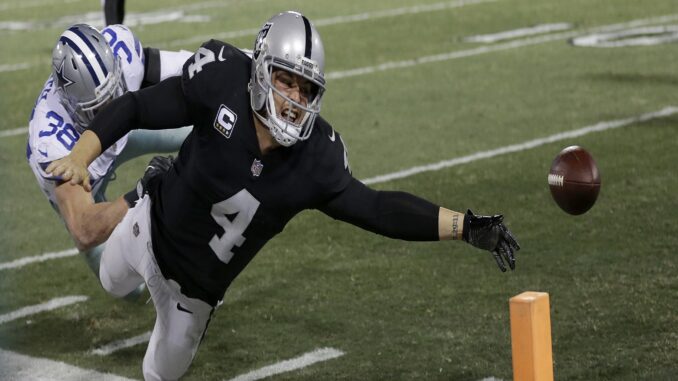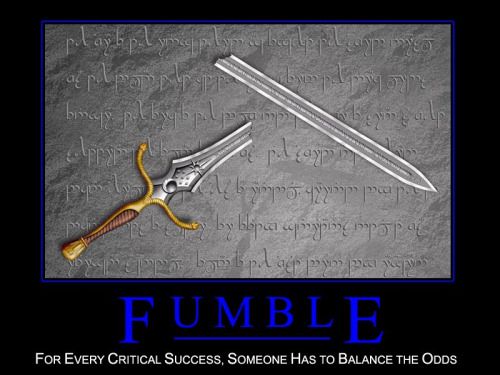
No, not that type of fumble...
Fumbles, AKA Crit Fails and – in some cases – Nat 1s, are a game mechanic that represents an absolute disastrous outcome for a PC or party attempting an action. This goes beyond the normal failure, where you don’t get what you want and have to figure out a different way to achieve your goals; a fumble means that your situation is about to get a lot worse.
 The conditions that trigger a fumble can vary widely between games. A common trigger in various games is rolling the lowest possible result on one or more dice. In this case, the chance of rolling a fumble will depend on how many sides the relevant dice have. What fumbles all have in common regardless of the game, though, is that there they have one or both of two types of consequences: mechanical and narrative. The most common type of consequences that occur from almost every fumble is narrative ones. There isn’t any hard limit to what those consequences can be, as long as it significantly raises the stakes and makes sense in the context of the story. Less common are mechanical consequences. When they occur, mechanical consequences generally manifest as some sort of penalty to dice rolls or HP. Future attempts at achieving your goals become more difficult and/or your PC is that much closer to getting taken out.
The conditions that trigger a fumble can vary widely between games. A common trigger in various games is rolling the lowest possible result on one or more dice. In this case, the chance of rolling a fumble will depend on how many sides the relevant dice have. What fumbles all have in common regardless of the game, though, is that there they have one or both of two types of consequences: mechanical and narrative. The most common type of consequences that occur from almost every fumble is narrative ones. There isn’t any hard limit to what those consequences can be, as long as it significantly raises the stakes and makes sense in the context of the story. Less common are mechanical consequences. When they occur, mechanical consequences generally manifest as some sort of penalty to dice rolls or HP. Future attempts at achieving your goals become more difficult and/or your PC is that much closer to getting taken out.
How about an example of a fumble? Let’s say you play a Thief in any one of a number of d20-based fantasy RPGs. You come to a locked door, and you realize that your goal lies somewhere on the other side of it. Sure, you could have the Barbarian break down the door, but that could create a lot of noise. Being the resourceful Thief that you are, you decide that the best solution is for you to pick the lock. You roll the die, and it comes up a 1. Now since you failed, the GM could say that your lockpick breaks, and you’ll have to find another way to get to the other side. But you didn’t just fail, you fumbled – the stakes must be raised. After considering for a moment, the GM decides that your Thief manages to pick the lock, but when the door swings open you’re greeted by a whole contingent of guards, ready and raring to fight. Now that’s a fumble! The example given is purely one of narrative consequences. If the GM wanted to introduce mechanical consequences, they could decide that the lockpick broke in the process of opening the door, and future lockpicking attempts will be done at a penalty or become impossible because the PC no longer has the proper equipment.
 In any case, the result of the fumble above is that the Thief – and indeed the entire party – are in a whole new mess of trouble. They may have been sneaking around and avoiding confrontations up to this point, but now they’re face to face with a bunch of enemies they’ll need to subdue one way or another. It’s important to note that despite failing the check, the Thief still managed to pick the lock. This is because the most important aspect of a failed check should be to raise the stakes, not necessarily to fail to accomplish the action; this is doubly true for fumbles. The GM could of course have decided to have the Thief fail to pick the lock and set off an alarm; that definitely raises the stakes since everyone in the area would now be aware of the intruders. But the GM opted for something more dramatic, immediate, and – if I do say so myself – hilarious. The point is that there are plenty of ways to raise the stakes with or without failing the check, and it’s entirely up to the GM to decide what the most fun and appropriate consequence of a fumble will be.
In any case, the result of the fumble above is that the Thief – and indeed the entire party – are in a whole new mess of trouble. They may have been sneaking around and avoiding confrontations up to this point, but now they’re face to face with a bunch of enemies they’ll need to subdue one way or another. It’s important to note that despite failing the check, the Thief still managed to pick the lock. This is because the most important aspect of a failed check should be to raise the stakes, not necessarily to fail to accomplish the action; this is doubly true for fumbles. The GM could of course have decided to have the Thief fail to pick the lock and set off an alarm; that definitely raises the stakes since everyone in the area would now be aware of the intruders. But the GM opted for something more dramatic, immediate, and – if I do say so myself – hilarious. The point is that there are plenty of ways to raise the stakes with or without failing the check, and it’s entirely up to the GM to decide what the most fun and appropriate consequence of a fumble will be.
Do you like games that use fumble mechanics? Do you have any stories about an epic fumble from one of your games? Let me know in the comments below!
Do you have thoughts or questions about the article or suggestions for future content? Leave a comment below or drop me a line at jtdimino@d20radio.com.
